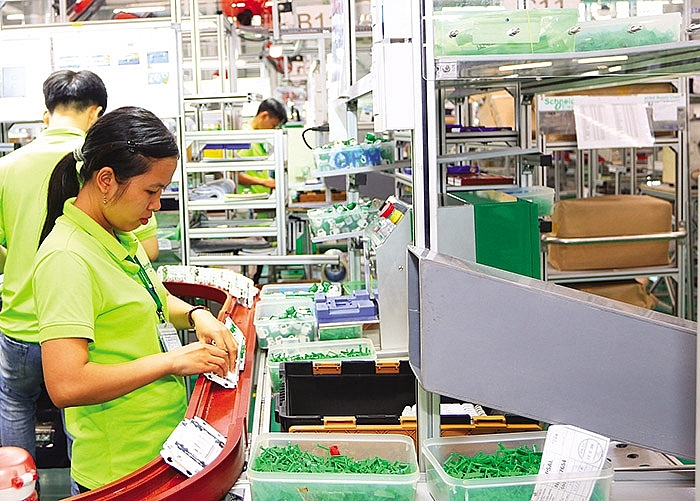Higher quality FDI flows to spur prosperity for all
 |
| Raymond Mallon |
How has foreign direct investment (FDI) made an impact on Vietnam’s economic growth over the last 30 years?
Living in Vietnam over these decades, I have seen FDI help transform Vietnam from a low-income, commodity-based economy to an increasingly more dynamic mixed economy via the transfer of technology, capital, skills, know-how, and access to international markets. This has helped accelerate growth in productivity, incomes and living standards, and resulted in an unprecedented reduction in poverty levels.
The economy has become more diversified with a shift from dependence on unprocessed commodities, to assembly and production of more sophisticated goods. FDI has also helped to build quality tourism, education, and health services. More generally, FDI is helping enhance the visibility and reputation of made-in-Vietnam products and services in international markets. FDI has also helped increase tax revenues, helping Vietnam move towards more sustainable public sector financing, and facilitating increase expenditure on essential public services and infrastructure.
Do you think that Vietnam’s investment climate is more attractive than other countries in the region?
Yes, the easy explanation for this is Vietnam’s low-cost labour with a relatively strong and inclusive education system, and a rapidly growing middle-income consumer market. Vietnam’s proximity to rapidly-growing economies, combined with political and economic stability, an improving regulatory environment for investment, and a commitment to support individual advancement and innovation are also important factors.
The icing on the cake for FDI is the growing access to international markets generated by Vietnam’s growing participation in existing and proposed international economic co-operation agreements, notably the ASEAN Economic Community, the Comprehensive and Progressive Agreement for Trans-Pacific Partnership, the EU-Vietnam Free Trade Agreement, and the Regional Comprehensive Economic Partnership. These recently signed and proposed agreements are expected to provide an important additional stimulus to FDI flows into Vietnam.
But what are the trade-offs and lessons learned so far?
Vietnam’s strong growth has increased environmental, congestion, and social pressures. Thus, it is necessary to invest more in urban and regional infrastructure development and environmental protection to ameliorate these adverse impacts.
A specific lesson is that greater attention needs to be given to improving national environmental safeguards on both foreign and domestic investors, while ensuring that they comply with tax and other legal obligations. Poor compliance risks undermine society’s support for private investment.
There is also a need to look at what more can be done to accelerate development of the domestic business sectors, including strengthening links between domestic and foreign investors. Besides, it is important that Vietnam not only focus on economic growth. Government policies also need to include a focus on how FDI can contribute to better jobs, a better environment, and improved living standards.
The type of skills needed by investor and society are changing. There is need to better align national vocational training and education to better meet the changing needs of society and employers, and to ensure that the benefits of FDI are more equitably shared.
 |
| Foreign direct investment requires government policies to ensure a focus on improving jobs and living standards, Photo: Le Toan |
What improvements do you think can be made in Vietnam’s FDI regulatory environment?
The fact that there have been sustained improvements in already-high levels of FDI inflows into Vietnam is indicative of ongoing improvements. Another good indicator of progress is that many established foreign investors continue to invest in more and more new projects.
Vietnam has made good progress towards competitive neutrality to ensure that all enterprises regardless of ownership compete on a level playing field. Reforms to unify the enterprise and investment laws, streamline business regulations and administration, and moves towards a national competition policy have been particularly helpful. However, there are still areas of unnecessary complexity in regulations. This encourages corruption and discourages both foreign and domestic investment. The Resolution 19 process on improving the economy’s competitiveness has been helpful in gradually reducing this complexity. Ongoing government engagement with businesses to identify bottlenecks, and solutions to address them, will be critical to sustaining progress. The partnership between the Vietnam Chamber of Commerce and Industry and the Central Institute for Economic Management in resolving bottlenecks is a good example of private-public collaboration for national benefits.
Vietnam is about to implement its new FDI attraction strategy in 2019. What are your recommendations to raise the level of technology transfer of foreign enterprises?
Vietnam needs to have a sustained focus on the equitable provision of quality basic education, including foreign language training, with a renewed focus on developing university and vocational education.
The country should also look at policies to boost research and development (R&D), including greater collaboration between industry and academic researchers. Policymakers need to work with businesses to look at areas where intellectual property rights need to be better protected to encourage investment in R&D. The government should also create a better physical environment to attract and retain the best possible talent to stay in or move to Vietnam.
The link between local and international enterprises needs to be strengthened. This is in the interests of all businesses. This will require a continuing focus on building a stronger domestic private sector with more medium and large companies that are likely to have the scale and management systems needed to partner with foreign counterparts.
There is a need to build on recent achievements in developing domestic private companies by sustaining efforts to build strong market institutions, including independent regulators, competitive factor markets, and economic courts. There is need to better protect property rights, including stronger contract enforcement, foreclosure, and bankruptcy provisions. This will require renewed efforts to strengthen formal and informal dispute resolution mechanisms including economic courts.
With the new FDI strategy, what are the opportunities and challenges for Vietnam to lure investment in IT and automation?
In addition to the above-mentioned factors, I would add that the government needs to ensure increased investment in IT infrastructure and to continue to build IT-related skills. It will also be important to study and adopt international practices with respect to the regulation of e-commerce and cross-border trade, and with respect to the regulation of the IT sector, data protection, and social media.
IT and automation investment opportunities change quickly. Vietnam needs to be especially quick in responding to changing opportunities and challenges. Building a more effective responsive and client-oriented public service will be especially important in seizing potential opportunities to develop IT-related industries.
Currently, global trade is being impacted by the US-China trade dispute. How will this affect FDI in Vietnam?
The trade war is not only bad for the economies of both the US and China, but also for the rest of the world, and creates a real risk of a global slowdown in economic growth.
While there may be some benefits to some sub-sectors in terms of the relocation of FDI from China to Vietnam, these benefits may well be outweighed by the negative impacts of a global slowdown and potential exchange rate impacts on the Vietnamese economy. There is also a risk that the US could act against the trade deficit between the US and Vietnam with likely adverse impacts on FDI inflows.
What is your forecast for future FDI into the country?
Overall, I am optimistic. The biggest risk to sustained inflows of FDI in Vietnam is the current global uncertainties and, in particular, the growing calls for a protectionism in important international markets.
This risk is partly ameliorated by the strong national and regional commitment to economic co-operation and integration, and the strong fundamentals of the national economy.
I expect that the emerging trend of FDI moving into higher value components of regional production networks, notably recent increases in FDI into R&D and creative elements of production networks, will continue. This is particularly encouraging in terms of Vietnam’s future prosperity.
What the stars mean:
★ Poor ★ ★ Promising ★★★ Good ★★★★ Very good ★★★★★ Exceptional
 Tag:
Tag:
Related Contents
Latest News
More News
- Hermes joins Long Thanh cargo terminal development (February 04, 2026 | 15:59)
- SCG enhances production and distribution in Vietnam (February 04, 2026 | 08:00)
- UNIVACCO strengthens Asia expansion with Vietnam facility (February 03, 2026 | 08:00)
- Cai Mep Ha Port project wins approval with $1.95bn investment (February 02, 2026 | 16:17)
- Repositioning Vietnam in Asia’s manufacturing race (February 02, 2026 | 16:00)
- Manufacturing growth remains solid in early 2026 (February 02, 2026 | 15:28)
- Navigating venture capital trends across the continent (February 02, 2026 | 14:00)
- Motivations to achieve high growth (February 02, 2026 | 11:00)
- Capacity and regulations among British areas of expertise in IFCs (February 02, 2026 | 09:09)
- Transition underway in German investment across Vietnam (February 02, 2026 | 08:00)






















 Mobile Version
Mobile Version